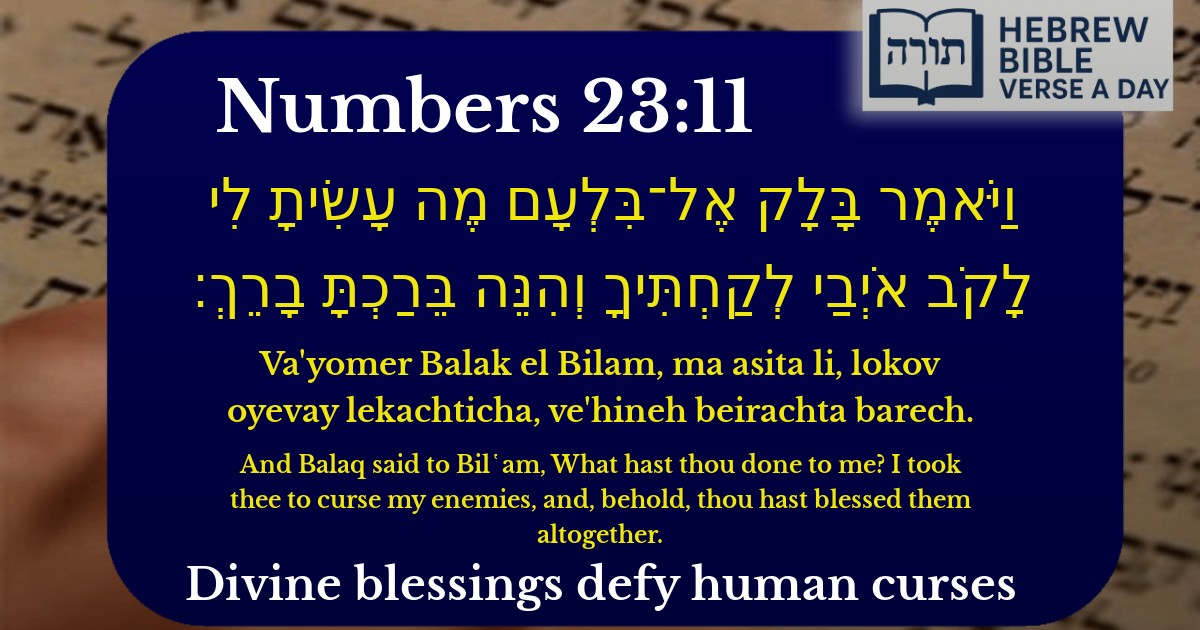Join Our Newsletter To Be Informed When New Videos Are Posted
Join the thousands of fellow Studends who rely on our videos to learn how to read the bible in Hebrew for free!
Hebrew Text
וַיֹּאמֶר בָּלָק אֶל־בִּלְעָם מֶה עָשִׂיתָ לִי לָקֹב אֹיְבַי לְקַחְתִּיךָ וְהִנֵּה בֵּרַכְתָּ בָרֵךְ׃
English Translation
And Balaq said to Bil῾am, What hast thou done to me? I took thee to curse my enemies, and, behold, thou hast blessed them altogether.
Transliteration
Va'yomer Balak el Bilam, ma asita li, lokov oyevay lekachticha, ve'hineh beirachta barech.
Hebrew Leining Text
וַיֹּ֤אמֶר בָּלָק֙ אֶל־בִּלְעָ֔ם מֶ֥ה עָשִׂ֖יתָ לִ֑י לָקֹ֤ב אֹיְבַי֙ לְקַחְתִּ֔יךָ וְהִנֵּ֖ה בֵּרַ֥כְתָּ בָרֵֽךְ׃
וַיֹּ֤אמֶר בָּלָק֙ אֶל־בִּלְעָ֔ם מֶ֥ה עָשִׂ֖יתָ לִ֑י לָקֹ֤ב אֹיְבַי֙ לְקַחְתִּ֔יךָ וְהִנֵּ֖ה בֵּרַ֥כְתָּ בָרֵֽךְ׃
🎵 Listen to leining
Parasha Commentary
📚 Talmud Citations
This verse is quoted in the Talmud.
📖 Sanhedrin 105b
The verse is discussed in the context of Balaam's inability to curse the Israelites, highlighting God's intervention to turn curses into blessings.
📖 Nedarim 31a
The verse is referenced in a discussion about vows and the power of blessings versus curses, illustrating how Balaam's intended curses were transformed into blessings.


Context of the Verse
The verse (Bamidbar 23:11) records the frustration of Balak, king of Moab, after Bilaam's first attempt to curse the Jewish people results in a blessing instead. Balak had hired Bilaam, a renowned prophet, to curse Israel, but Hashem compelled Bilaam to bless them instead.
Balak's Reaction
Rashi explains that Balak's exclamation, "What have you done to me?", reflects his deep disappointment and anger. Balak had invested great effort and resources to bring Bilaam, expecting curses, but instead received blessings. The Midrash Tanchuma (Balak 9) elaborates that Balak felt betrayed, as Bilaam had previously assured him of his ability to curse.
The Meaning of "לָקֹב אֹיְבַי" (To Curse My Enemies)
The term "לָקֹב" (to curse) is significant. Ramban notes that Bilaam's power was not in mere words but in his ability to pinpoint the precise moment of divine judgment (sha'at ra'ah) to invoke a curse. However, Hashem did not allow Bilaam to find such a moment, forcing him to bless instead.
Bilaam's Forced Blessing
The Talmud (Sanhedrin 105b) teaches that Bilaam intended to curse Israel, but Hashem transformed his words into blessings. The phrase "בֵּרַכְתָּ בָרֵךְ" ("you have blessed them altogether") emphasizes that the blessing was complete and undeniable, leaving Balak no room for reinterpretation.
Balak's Misunderstanding of Divine Will
Rabbeinu Bachya observes that Balak failed to recognize that Israel's protection came from Hashem. His frustration stemmed from his belief that Bilaam had independent power, ignoring that all prophecy and blessings flow from divine decree.
Key Lessons